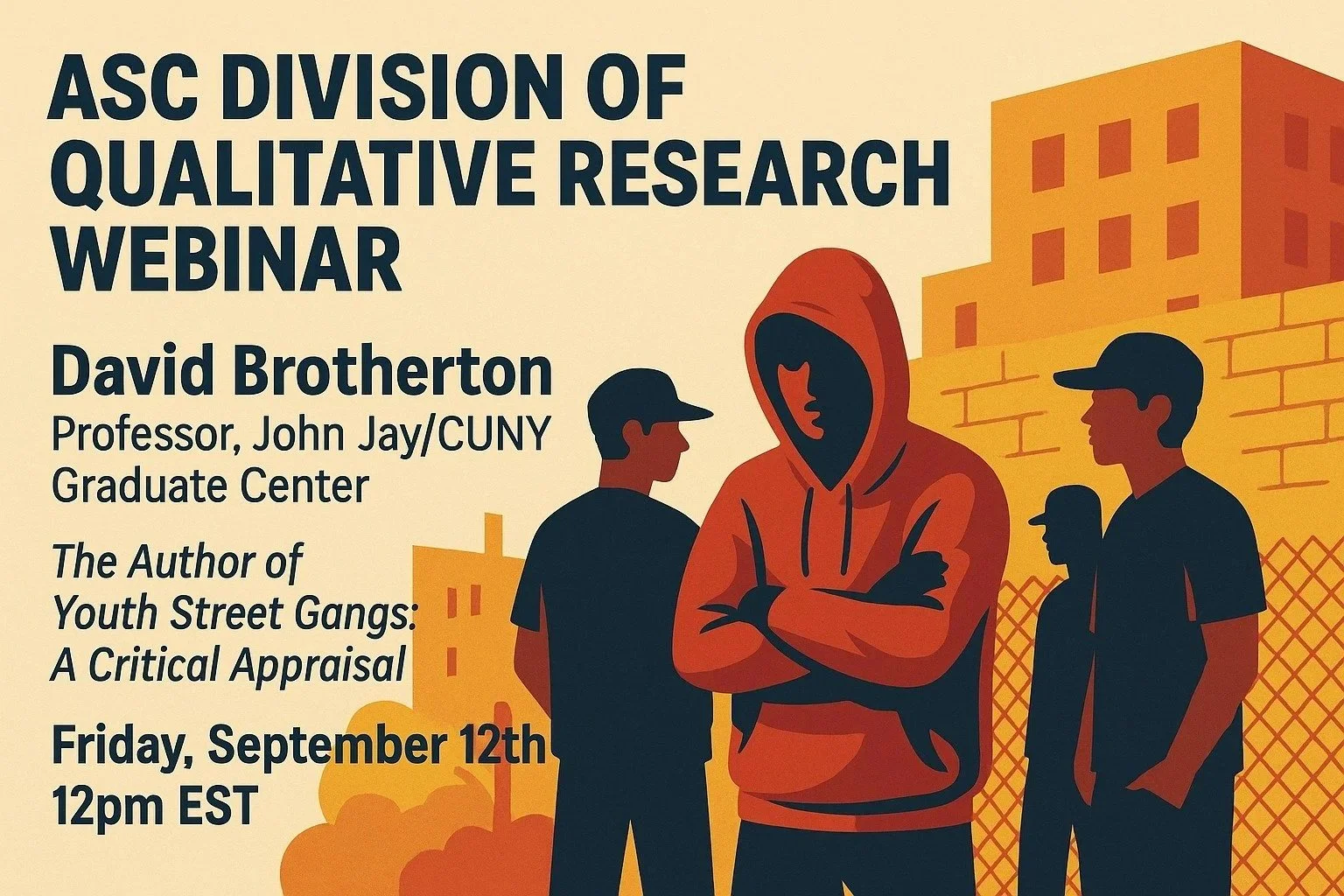
ASC Division of Qualitative Research Webinar: Youth Street Gangs
Please join us on Friday September 12 for a webinar featuring David Brotherton of John Jay/CUNY Graduate Center and author of Youth Street Gangs: A Critical Appraisal.
Zoom link: https://temple.zoom.us/j/99872298090?from=addon#successLinks to an external site.

Anti-Fascist Cabaret
Big Tent Production presents Anti-Fascist Cabaret, with performance from SCTS’ Prof. David Brotherton.
A musical comedic cabaret boldly facing the current political insanity. Entertaining acts and serious speakers. Cause what good is screaming alone in your room
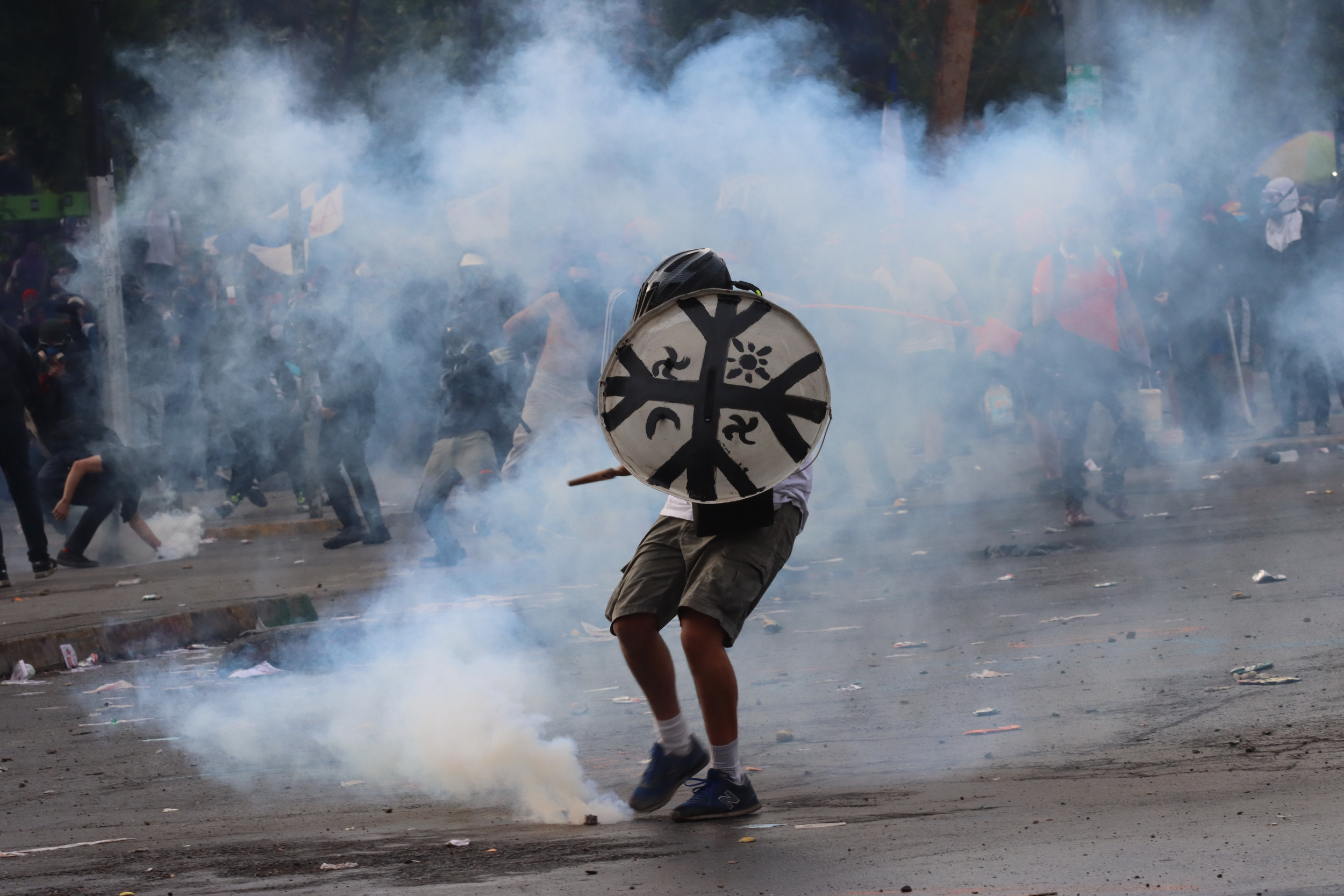
Decolonizing Criminology: Reckoning with the Legacy and Impact of Colonial Thought on Criminological Discourse, Crime, and Punishment
Postcolonial theory, Indigenous criminology, Southern criminology, and green criminology are relatively “new” areas of criminological discourse that challenge the foundations of what we have come to know as sociological and criminological theory. Criminology as a discipline, originating in the Global North, has a difficult history that has often resulted in the silencing and exclusion of those at the margins and from the Global South. The legacy of this endures to this day. This symposium reckons with this history and explores how this developing body of work is advancing—or not—a more diverse approach to research in criminology, leading to greater inclusivity of voices often excluded by Eurocentric and colonial epistemologies. It asks what it is that we need to do to bridge global divides and address the power imbalances that have privileged the knowledge and policy agendas of the Global North. For it is only by doing this that we— as criminologists and sociologists—can begin to confront the most pressing issues of our time.
Themes: Interrogating the Past | Reckoning with the Present | Interrupting the Curriculum | Challenges for the Future|
Speakers:
Dr Biko Agozino, Virginia Tech.
Dr. Nigel South, University of Essex, UK
Dr. Viviane Saleh-Hanna, U.Mass. Dartmouth
Dr. Marcia Esparza, Historical Memory Project, John Jay College of Criminal Justice, CUNY
Dr. Alex Vitale, Brooklyn College, CUNY
Dr. Jayne Mooney Social Change and Transgressive Studies Project, John Jay College of Criminal Justice and the Graduate Center, CUNY
Dr. Albert de la Tierra, San Francisco State University
Angelica Macario, Mayan K'iche from El Quiché, Guatemala, Human rights activist
Dr. Ignasi Bernat, Colonial State Crime and Ecocide, University of Barcelona
Dr. David Brotherton, Social Change and Transgressive Studies Project, John Jay College of Criminal Justice and the Graduate Center, CUNY
The symposium is a proud collaboration between Social Change and Transgressive Studies Project; Historical Memory Project (HMP), John Jay College of Criminal Justice; Policing and Social Justice Project, Brooklyn College; Department of Sociology; the Office for the Advancement of Research (OAR), John Jay College of Criminal Justice.
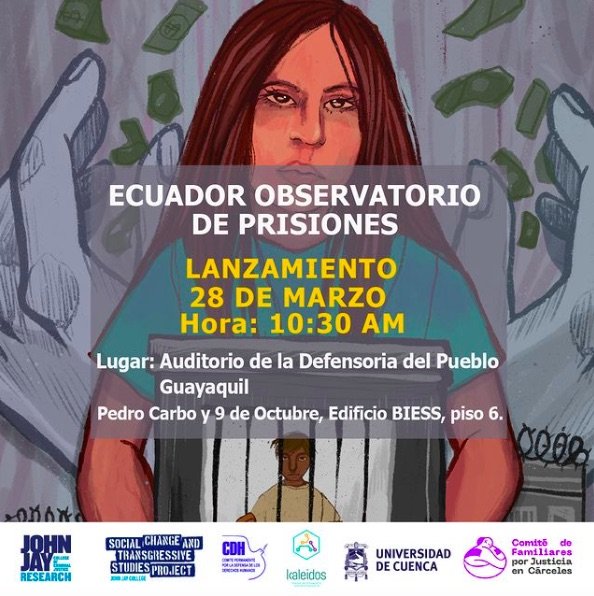
Observatorio de Prisiones, martes 28 de marzo en #Guayaquil.
Únete al acto de lanzamiento de la plataforma Ecuador - Observatorio de Prisiones, a realizarse el próximo martes 28 de marzo en #Guayaquil.
Esta plataforma virtual es impulsada por el Comité de Familiares por Justicia en Cárceles, Centro de Etnografía Interdisciplinaria Kaleidos – Universidad de Cuenca, Comité Permanente por la Defensa de los Derechos Humanos CDH – Guayaquil y John Jay College of Criminal Justice de Estados Unidos.
Contaremos con la presencia de expertos en el tema, quienes compartirán sus conocimientos y experiencias.
¡No te pierdas la oportunidad de conocer más sobre este importante proyecto y ser parte del cambio!
La entrada es gratuita y abierta al público en general.
Fecha : Martes, 28 de marzo
Hora : 10:30
Lugar : Auditorio de la Defensoría del Pueblo en Guayaquil
Dirección : Av. 9 de octubre y Pedro Carbo (edificio del BIESS, piso 6)
¡Te esperamos!
#EcuadorObservatorioDePrisiones593 #SinDignidadNohayPaz
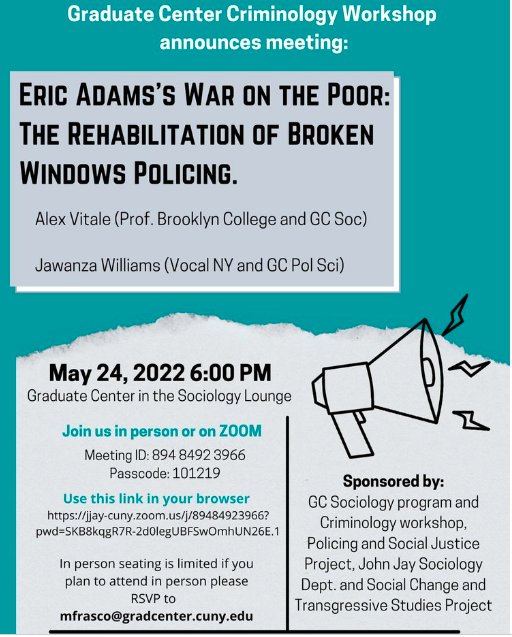
Eric Adams’ War on the Poor: The Rehabilitation of Broken Windows Policing
Please note this event is hybrid, with in-person and Zoom options

Resilient Communities Against Transnational Gangs
To watch a recording of this event, paste this link in your browser:
https://www.youtube.com/watch?v=7NHOdl7bX2o&ab_channel=CLACSNYU

Book Talk: Migration and Mortality: Social Death, Dispossession and Survival in the Americas
Join us for our upcoming book talk!

Social Control and the Pandemic: Incarceration, Detention, and Deportation in the time of COVID 19
VIA ZOOM
Meeting ID: 897 8694 1122
Passcode: 130056
COVID in North Carolina Jails
Felicia Arriaga, Appalachian State University
Beginning in the spring of 2020, our research team (Dr. Dana Rice, Stefania Arteaga, Anna Biache, Alice Li, Jessie Rios, and Max Rose) began requesting information from Sheriff Offices across North Carolina regarding their responses to COVID-19. In these requests, we wanted to collect the following information that is not readily available (the case in most states, not just during COVID-19): (1) Pre-COVD Population; (2) Current Population; (3) Health & Safety Protocols (4) Decarceration Efforts/Jail Population Decrease Efforts; (5) COVID-19 Testing & Results In the first round of data collection, approximately half of the 98 jails/Sheriff Offices in the state responded to our inquiries and in the second round, a similar amount responded. Phase 3 of our data collection will include interviews with stakeholders in a sample of counties to better understand their protocols, attempts to stop COVID-19 outbreaks, and vaccination plans.
Women, Deportation, and Violence in Lockdown NYC
Yolanda Ortiz-Rodriguez, John Jay College of Criminal Justice, CUNY
Jayne Mooney, John Jay College of Criminal Justice, CUNY
Amid growing concerns of the pandemic and the forced lockdown experienced by many, the impact the new mandates would have on the victims of domestic violence- particularly, undocumented women, was important to explore. During the months following the lockdown in NYC, interviews with research participants, domestic violence organization leaders, and advocates provided insights on how the women were navigating services and how fears of deportation impacted the decisions they made around their safety and that of their families during the pandemic.
Migrant Detention, Deportation, and COVID in New Jersey
Sarah Tosh, Rutgers University-Camden
Ulla Berg, Rutgers University-New Brunswick
K. Sebastian León, Rutgers University-New Brunswick
This research examines the relationship between COVID-19 and processes of migrant detention and deportation, through a case study of the early pandemic response in four detention centers in New Jersey — where non-citizens who face deportation in New York City immigration courts are often held. Drawing on publicly available reports and in-depth interviews with wardens, immigration lawyers, advocates, and previously detained individuals, we examine the role of immigration detention in the attempted containment of COVID-19, and the effects of the pandemic response on detained migrants.
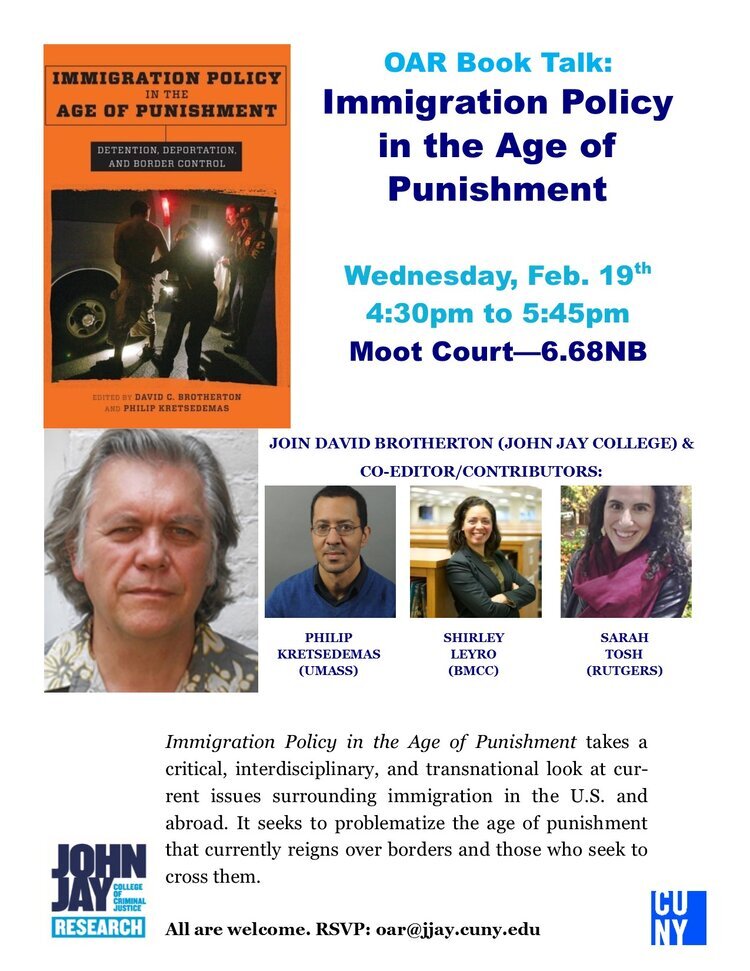
OAR Book Talk: Immigration Policy in the Age of Punishment
Immigration Policy in the Age of Punishment takes a critical, interdisciplinary, and transnational look at current issues surrounding immigration in the U.S. and abroad. It seeks to problematize the age of punishment that currently reigns over borders and those who seek to cross them.
To watch a recording of this event, paste the link below in your browser:
https://www.youtube.com/watch?v=yfvIG-5YZxY&ab_channel=JohnJayResearch



